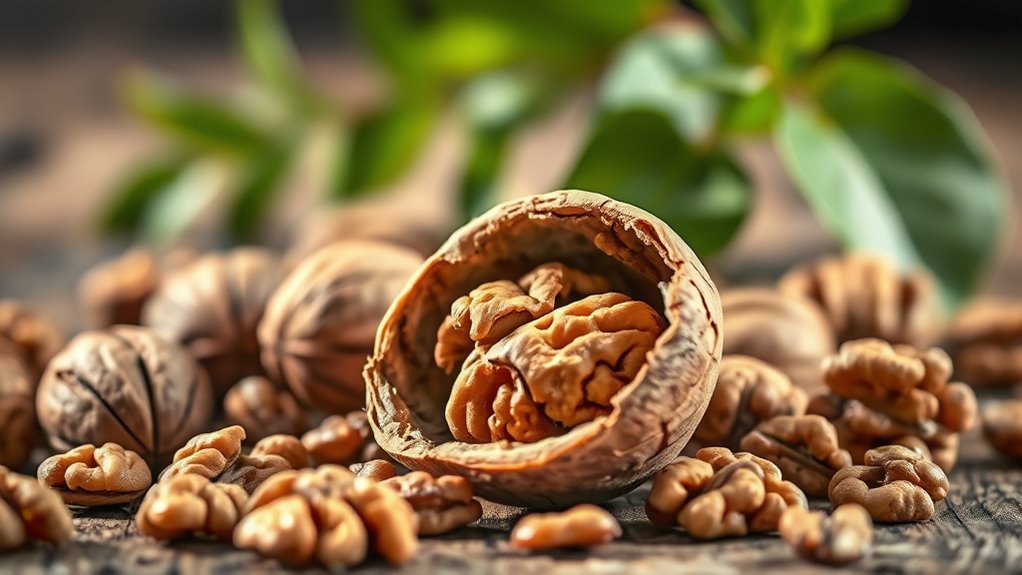Yes, walnuts are keto-friendly! They contain about 4 grams of net carbs per ounce and are packed with healthy fats, primarily polyunsaturated fats, which are great for heart health. Additionally, they offer protein and fiber, helping you feel full. Incorporating walnuts into your diet can support overall wellness while maintaining ketosis. If you’re curious about more ways to enjoy walnuts and their benefits in your keto meal plan, there’s plenty more to explore!
Nutritional Profile of Walnuts

Walnuts are a powerhouse of nutrition, making them an excellent choice for those following a keto diet. When you look at walnut varieties, such as English and black walnuts, you’ll find they offer unique nutritional benefits. In nutritional comparisons, walnuts are particularly high in healthy fats, with about 18 grams of fat per ounce, primarily polyunsaturated fats, which are heart-healthy. They also deliver protein and fiber, helping to keep you satiated. Plus, these nuts are rich in antioxidants and essential vitamins, contributing to overall well-being. Including walnuts in your diet can provide the necessary nutrients while maintaining your carb limits, making them a flexible and beneficial option for your keto lifestyle. Enjoy the freedom of choice with these nutrient-dense nuts!
The Role of Fats in a Keto Diet

Since the keto diet emphasizes high fat intake, understanding the role of fats is essential for achieving its benefits. Dietary fats serve as your primary energy source, allowing your body to enter ketosis, where it burns fat instead of carbohydrates. Choosing the right fat sources is vital; focus on healthy options like avocados, olive oil, and nuts, including walnuts. These fats not only provide energy but also support brain health and hormone production. Incorporating a variety of dietary fats can enhance your overall health while keeping meals satisfying. Remember, not all fats are created equal, so prioritize unsaturated fats over saturated ones for better health outcomes. Embrace the freedom of a fat-rich lifestyle while being mindful of your choices.
Carbohydrate Content in Walnuts

While many people may worry about carbohydrate intake on a keto diet, walnuts can be a surprisingly fitting option. With about 4 grams of net carbs per ounce, they’re a low-carb snack that won’t derail your dietary goals. Unlike many other carbohydrate sources, walnuts offer healthy fats and protein, making them a satisfying choice for those on a keto journey. They also provide essential nutrients, adding value to your meals or snacks. If you’re searching for keto friendly snacks, incorporating walnuts into your diet can help you maintain your carb limits while enjoying a delicious treat. Balancing your macro intake is essential, and walnuts can easily fit into your keto lifestyle without sacrificing flavor or satisfaction.
Health Benefits of Walnuts
Walnuts are packed with essential nutrients, making them a great addition to your diet. They’re particularly beneficial for heart health and possess anti-inflammatory properties that can support overall wellness. Incorporating walnuts into your meals can provide these valuable health advantages while fitting well within a keto lifestyle.
Nutrient-Dense Profile
Nuts are often hailed as nutritional powerhouses, and walnuts are no exception. With various walnut varieties available, you can enjoy a range of flavors and textures while benefiting from their rich nutrient profile. Walnuts are packed with healthy fats, protein, fiber, vitamins, and minerals, making them an excellent addition to your diet. Their unique combination of nutrients aids in nutrient absorption, ensuring your body effectively utilizes what you consume. Additionally, they’re high in antioxidants, which help combat oxidative stress. By incorporating walnuts into your meals or snacks, you not only enhance your nutrient intake but also satisfy your cravings, giving you the freedom to enjoy delicious food while adhering to your dietary choices.
Heart Health Benefits
When it comes to promoting heart health, incorporating walnuts into your diet can be a smart choice. These nutrient-dense nuts are packed with omega-3 fatty acids, which are known to support cardiovascular health. Studies show that regularly consuming walnuts can help reduce bad cholesterol levels and improve overall heart function. Their rich antioxidant content also plays a role in protecting your heart from oxidative stress. Plus, the fiber in walnuts aids in maintaining a healthy weight, further contributing to cardiovascular benefits. So, if you’re looking to enhance your heart health naturally, adding a handful of walnuts to your daily routine might just be the delicious and nutritious option you need. Your heart will thank you!
Anti-Inflammatory Properties
In addition to their heart health benefits, walnuts also boast impressive anti-inflammatory properties that can contribute to overall wellness. These nuts are rich in antioxidants, which help combat oxidative stress and promote inflammation reduction in your body. Including walnuts in your diet can offer several advantages:
- Supports joint health by decreasing inflammatory markers
- Enhances brain function, potentially lowering neuroinflammation
- Aids in cardiovascular health through improved blood vessel function
- May reduce the risk of chronic diseases linked to inflammation
Comparing Walnuts to Other Nuts
While walnuts are often praised for their unique nutritional profile, comparing them to other nuts reveals important distinctions that can influence your dietary choices. In a walnuts comparison with almonds, for example, you’ll find almonds are lower in carbs and higher in vitamin E, making them a popular choice for keto enthusiasts. On the other hand, macadamia nuts boast a higher fat content, which can also fit well within a ketogenic diet. Each nut variety offers its own benefits, whether it’s fiber, protein, or healthy fats. By understanding these differences, you can make informed decisions that align with your health goals, ensuring you enjoy the freedom to choose the best options for your lifestyle.
Portion Control and Serving Sizes
When it comes to incorporating walnuts into your keto diet, knowing the recommended serving size is essential for maintaining your macronutrient balance. A typical serving is about one ounce, which offers a good nutrient density while keeping your carb intake in check. Understanding portion size guidelines can help you enjoy the health benefits of walnuts without overdoing it.
Recommended Serving Size
A typical serving size of walnuts on a keto diet is about 1 ounce, which equates to roughly 14 halves. Practicing portion control is essential for staying within your daily carb limits while enjoying these nutritious nuts. Here are some serving suggestions to keep in mind:
- Pair walnuts with low-carb cheese for a satisfying snack.
- Toss them into salads for added crunch and healthy fats.
- Blend walnuts into smoothies for a creamy texture.
- Use them in baking to enhance flavor without excess carbs.
Nutrient Density Analysis
Understanding the nutrient density of walnuts is essential for optimizing your keto diet. These nuts are packed with healthy fats, protein, and fiber, which can enhance nutrient absorption in your body. Walnuts also contain important vitamins and minerals, contributing to dietary synergy by working together to support overall health. When you include walnuts in your meals, you’re not just adding calories; you’re enriching your diet with nutrients that promote satiety and help you feel satisfied longer. This balance is significant, especially on a keto diet, where you want to maximize the benefits while controlling your portions. So, enjoy walnuts in moderation, and reap the rewards of their nutrient-rich profile without compromising your dietary goals.
Portion Size Guidelines
To effectively incorporate walnuts into your keto diet, it is important to be mindful of your portion sizes. Practicing portion control helps you reap the benefits of walnuts without exceeding your carb limits. Here are some serving suggestions to keep in mind:
- One ounce (about 14 halves): This is a standard serving size, providing healthy fats without overdoing it.
- Add to salads: Toss a few walnut halves for crunch and flavor, enhancing your meal without too many carbs.
- Nut butter: Spread a thin layer of walnut butter on keto-friendly bread, but watch the quantity.
- Snack wisely: Pair walnuts with cheese or other low-carb snacks to maintain balance.
Creative Ways to Include Walnuts in Your Keto Meal Plan
While incorporating walnuts into your keto meal plan might seem straightforward, there are numerous creative ways to make them a staple in your diet. For instance, you can whip up a delicious walnut pesto by blending walnuts with basil, garlic, and olive oil for a flavorful sauce over zoodles or grilled veggies. Need a quick bite? Prepare walnut snacks by roasting them with your favorite spices for an easy, crunchy treat. You can also toss chopped walnuts into salads for added texture or blend them into smoothies for a nutrient boost. Finally, consider using walnuts as a crust for meats or fish, elevating your dishes while keeping them keto-friendly. Enjoy your culinary freedom with these innovative walnut ideas!
Frequently Asked Questions about Walnuts and the Keto Diet
1. Are walnuts keto-friendly?
Yes, walnuts are keto-friendly. They are low in carbohydrates and high in healthy fats, making them an excellent choice for anyone following a ketogenic diet. A typical serving of walnuts (about 1 ounce or 28 grams) contains approximately 4 grams of net carbs, which fits well within the daily carb limit for a keto diet.
2. How many walnuts can I eat on a keto diet?
The amount of walnuts you can eat on a keto diet depends on your overall daily macro goals. Generally, a serving size of 1 ounce (about 14 halves) is a good starting point. This serving provides healthy fats, protein, and fiber, contributing to your daily nutritional needs while keeping carb intake low. Just be mindful of portion sizes, as nuts can be calorie-dense.
3. What are the health benefits of walnuts on a keto diet?
Walnuts offer numerous health benefits, especially for those on a keto diet. They are rich in omega-3 fatty acids, which support heart health and reduce inflammation. Additionally, walnuts contain antioxidants, vitamins, and minerals that contribute to overall well-being. Their fiber content aids digestion and helps keep you feeling full, which can be beneficial when managing weight on a keto diet.
4. Can walnuts help with weight loss on a keto diet?
Yes, walnuts can aid in weight loss on a keto diet due to their high healthy fat content and fiber, which promote satiety. Incorporating walnuts into meals or snacks can help curb hunger and reduce the likelihood of overeating. However, it’s essential to consume them in moderation, as their high-calorie density could lead to weight gain if eaten in excess.
5. Are there any downsides to eating walnuts on a keto diet?
While walnuts are generally beneficial on a keto diet, there are a few considerations. They are calorie-dense, so it’s important to monitor your intake to avoid excessive calorie consumption. Some individuals may also have allergies to nuts, including walnuts. Lastly, if you’re following a strict ketogenic diet, be cautious of how walnuts fit into your overall macronutrient goals, particularly if you are tracking net carbs closely.
References
- https://www.ncbi.nlm.nih.gov/pmc/articles/PMC6267311/
- https://www.healthline.com/nutrition/walnuts-keto-friendly
- https://www.bbc.co.uk/news/health-49360454
- https://www.sciencedirect.com/science/article/pii/S089990071930095X
- https://www.webmd.com/diet/health-benefits-walnuts
- https://www.heart.org/en/news/2020/03/30/why-walnuts-may-be-the-best-nut-for-your-heart
- https://www.mayoclinic.org/healthy-lifestyle/nutrition-and-healthy-eating/expert-answers/walnuts/faq-20057814
- https://www.verywellfit.com/what-are-the-nutritional-benefits-of-walnuts-4110422
- https://www.nutrition.gov/topics/whats-food/walnuts


